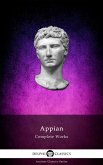In 'Discourses on Livy', Niccolò Machiavelli exhibits a brilliant confluence of historical analysis and political philosophy. As an interpretation and critique of Livy's account of Roman history, Machiavelli's work diverges from the pure pragmatism of his earlier 'The Prince', taking on a more discursive tone. Throughout the treatise, Machiavelli elucidates the political lessons to be gleaned from ancient Rome, keenly applying them to the contemporary landscape of the Italian city-states of the early 16th century. The prose, while dense, is incisively engaging, with its relevance extending far beyond the period of its creation to offer timeless reflections on statecraft, governance, and public ethics. Niccolò Machiavelli was a quintessential Renaissance polymath, whose personal experiences deeply informed his writings. As a former diplomat and official in Florence, his acute observations of political machinations lend a palpable authenticity to his theorizations. Through his exile and close study of history, Machiavelli developed a profound understanding of the factors that contribute to the rise and fall of states, making 'Discourses on Livy' not only a scholarly commentary on classical texts but also a seminal work, infusing his lived experiences with enduring political thought. This book is indubitably essential for students of political science and philosophy, illuminating the mechanisms of power and public policy through historical exemplars. 'Discourses on Livy' is particularly invaluable to those seeking to comprehend the foundations of modern political theory and the practical intersections of history and politics. With intellectual rigor and piercing insight, Machiavelli's opus stands as a monumental guidepost in the understanding of governance and its historical moorings, challenging and enriching scholars and lay readers alike with its timeless wisdom.
Dieser Download kann aus rechtlichen Gründen nur mit Rechnungsadresse in A, B, BG, CY, CZ, D, DK, EW, E, FIN, F, GR, H, IRL, I, LT, L, LR, M, NL, PL, P, R, S, SLO, SK ausgeliefert werden.









